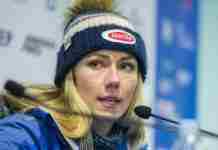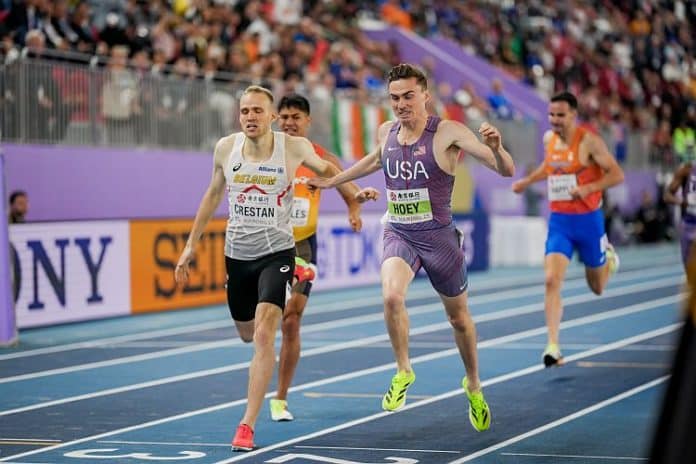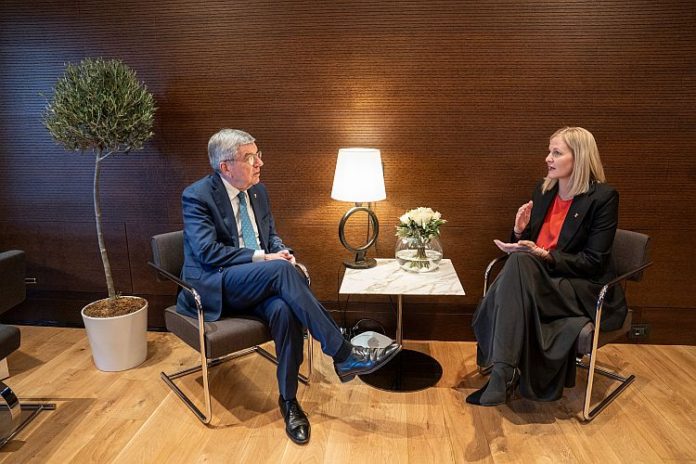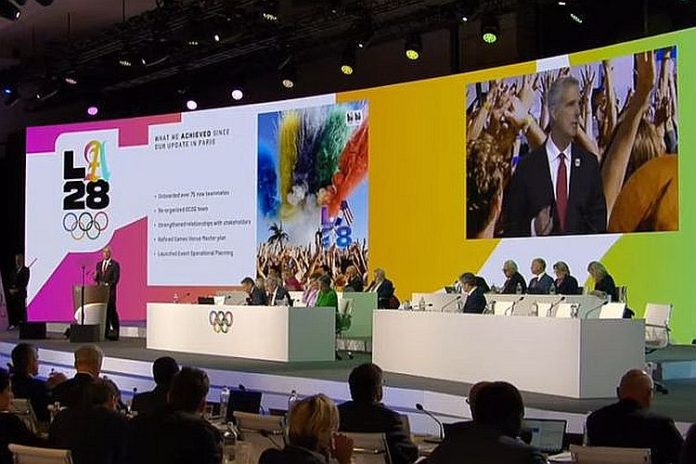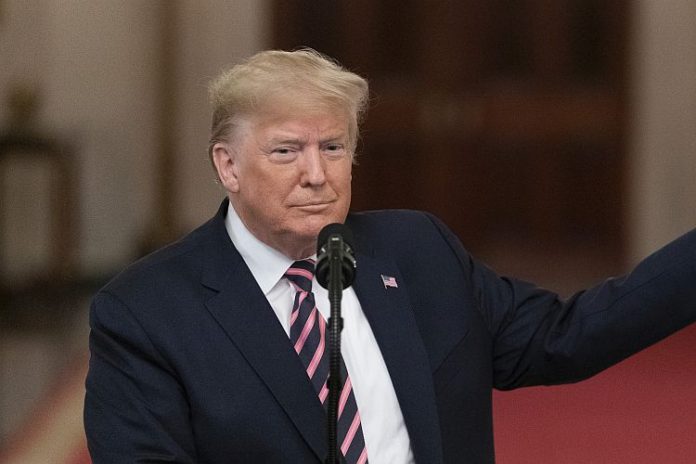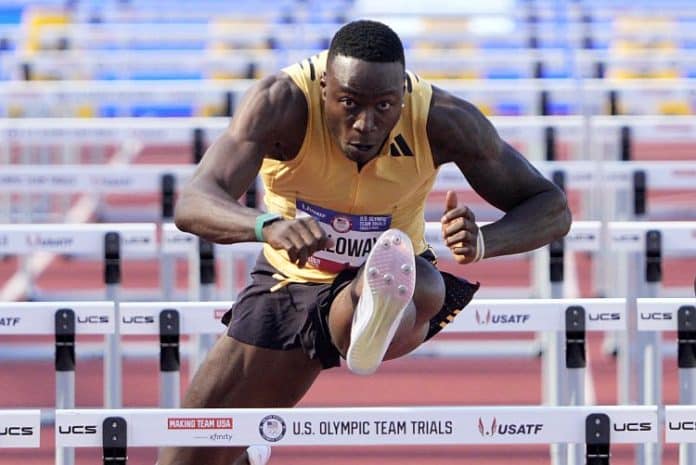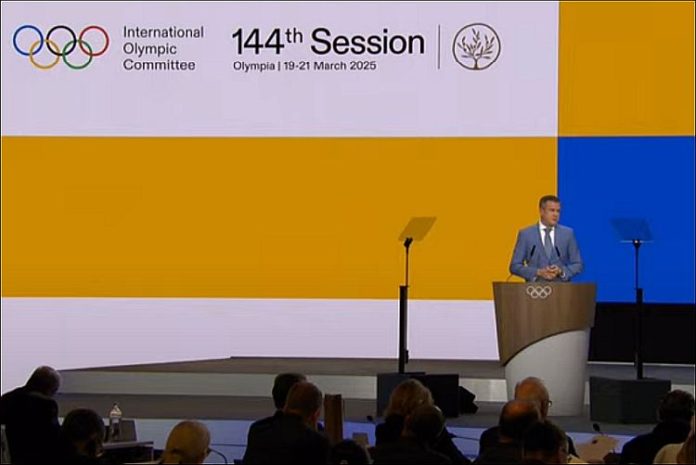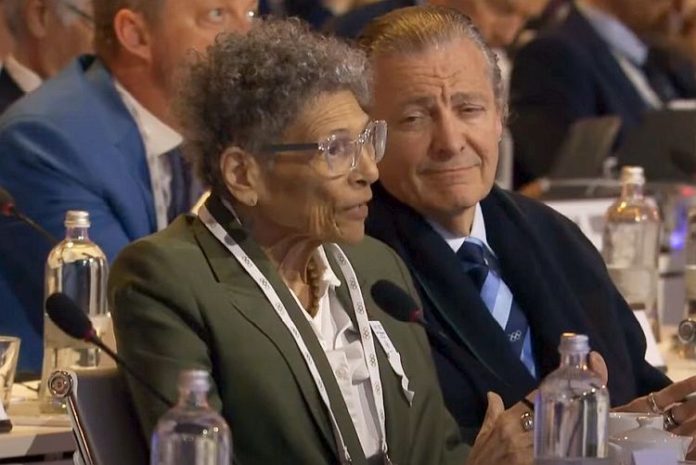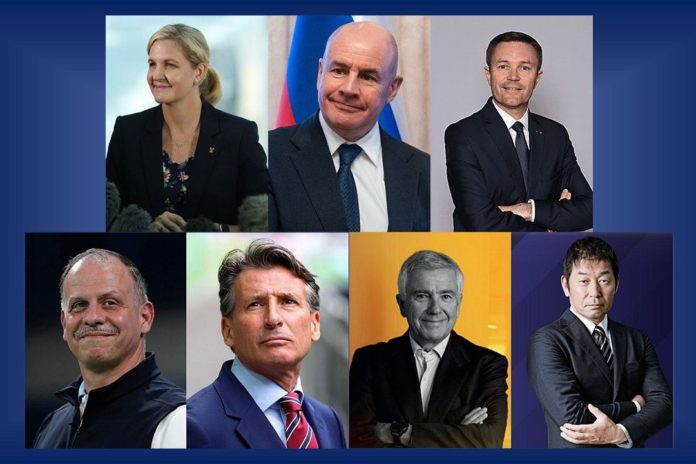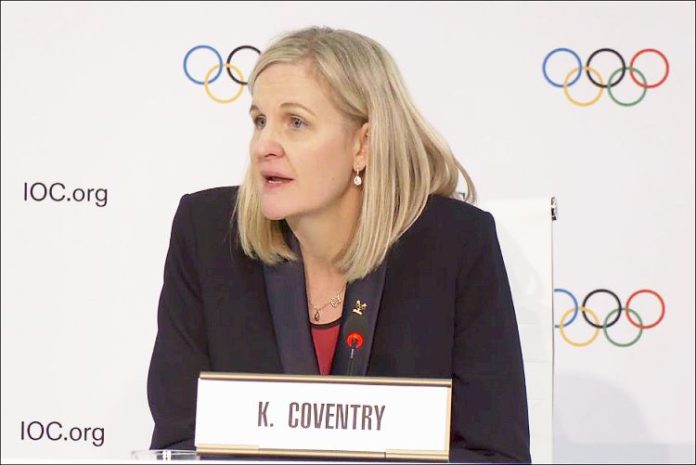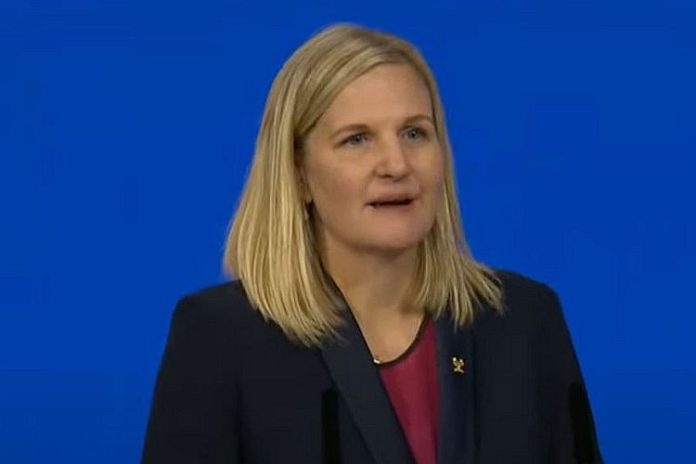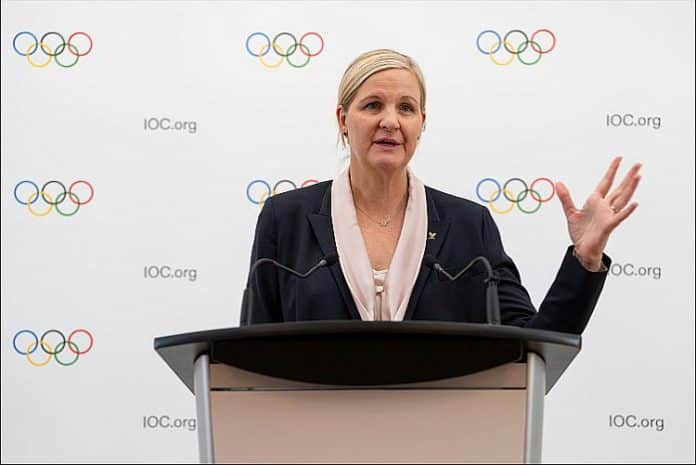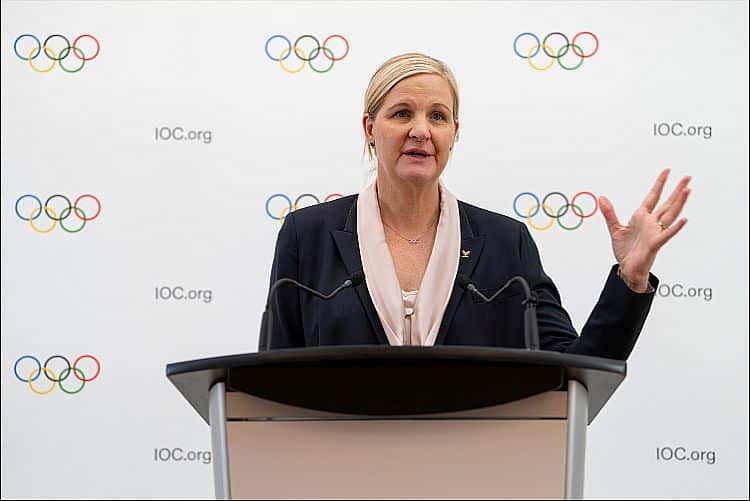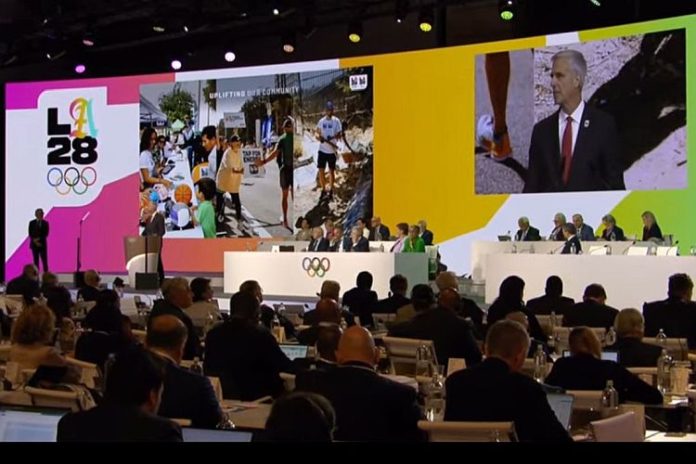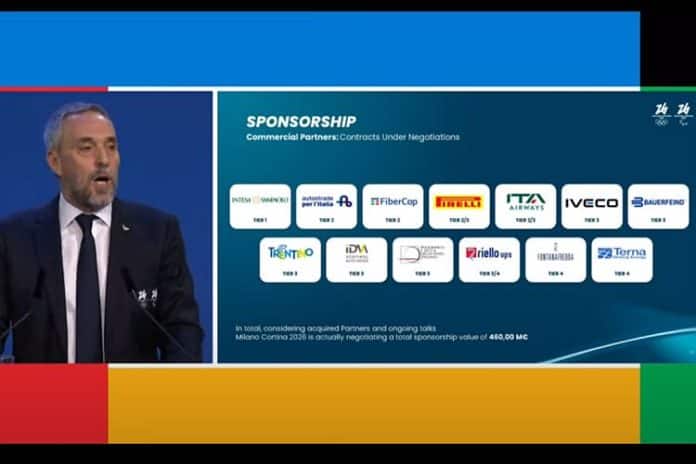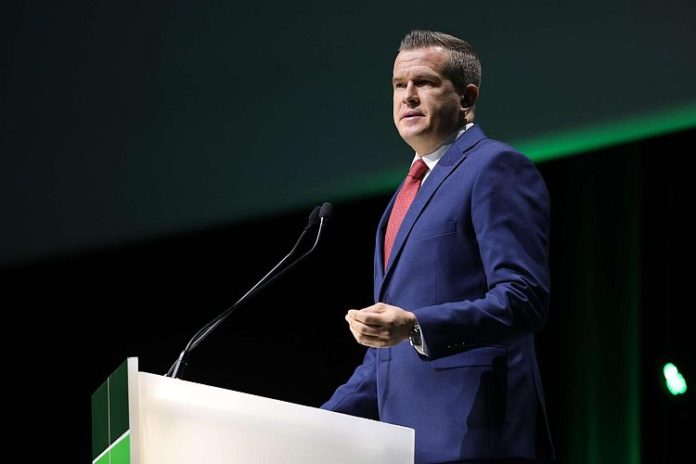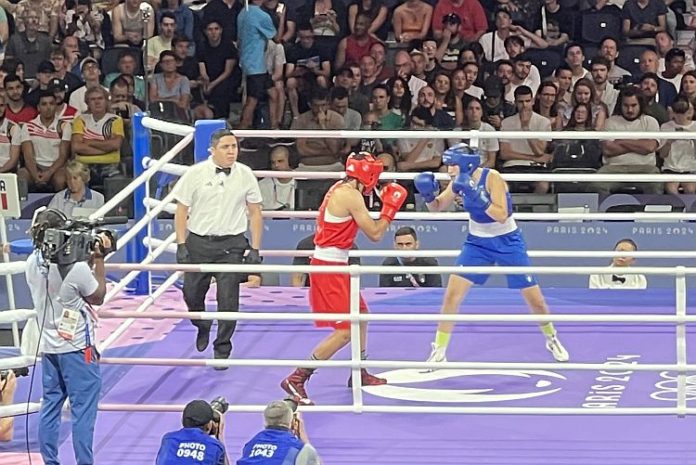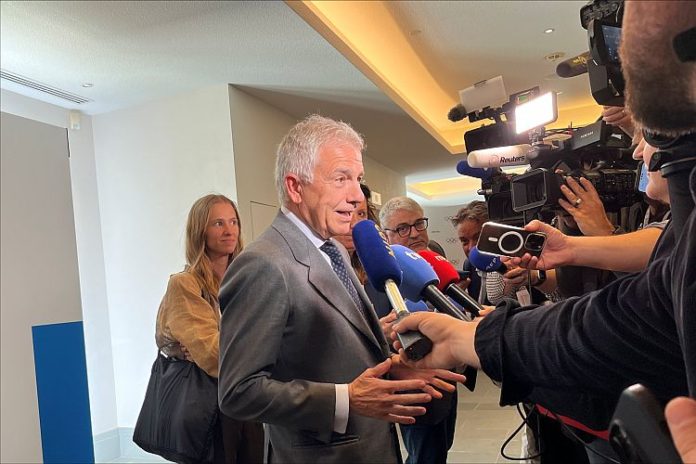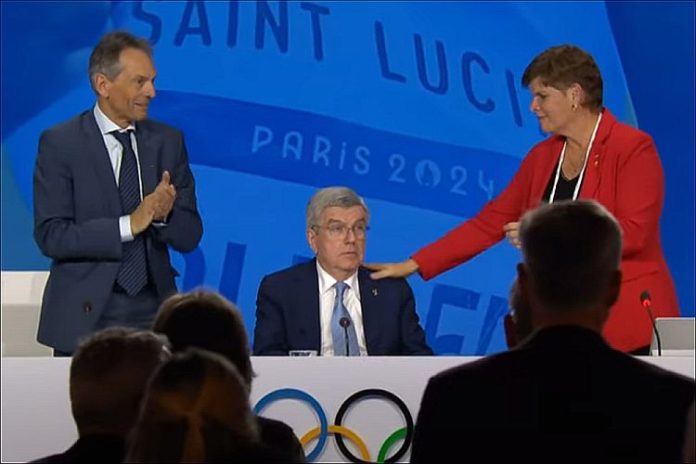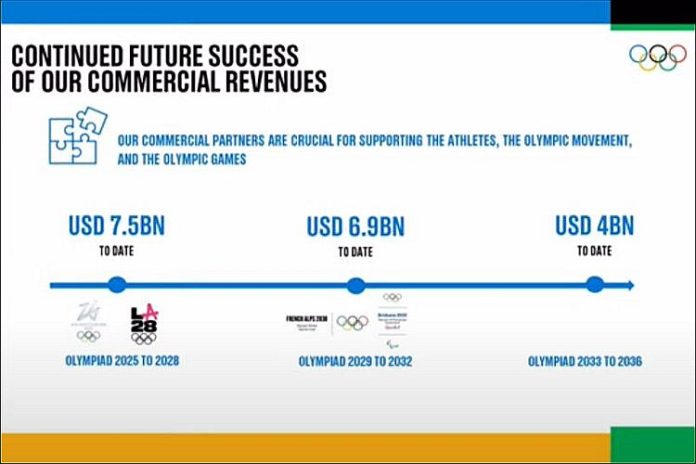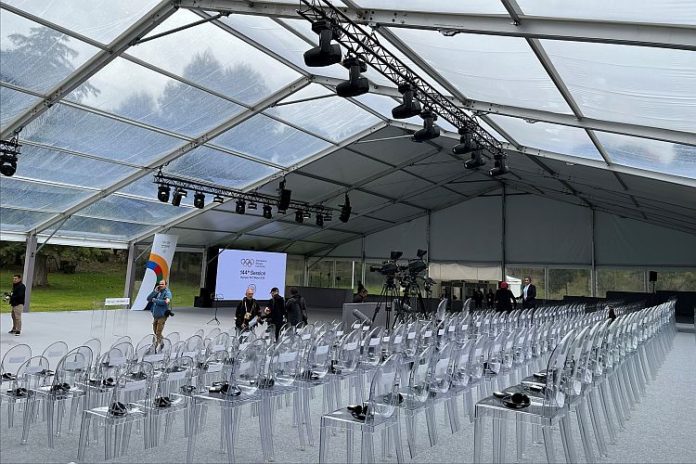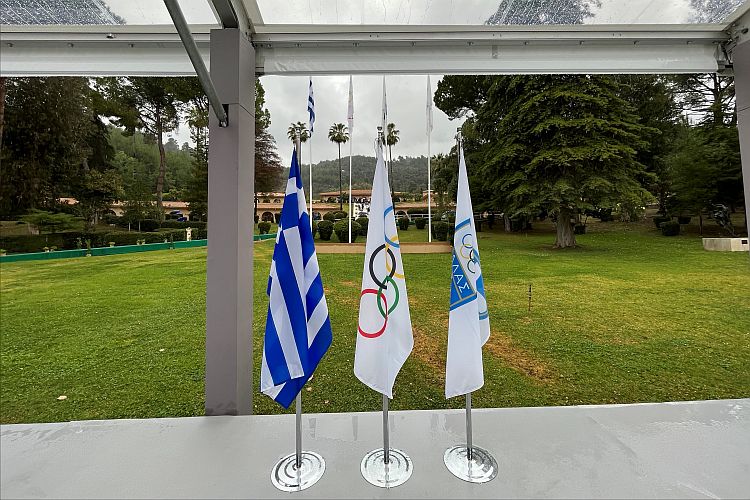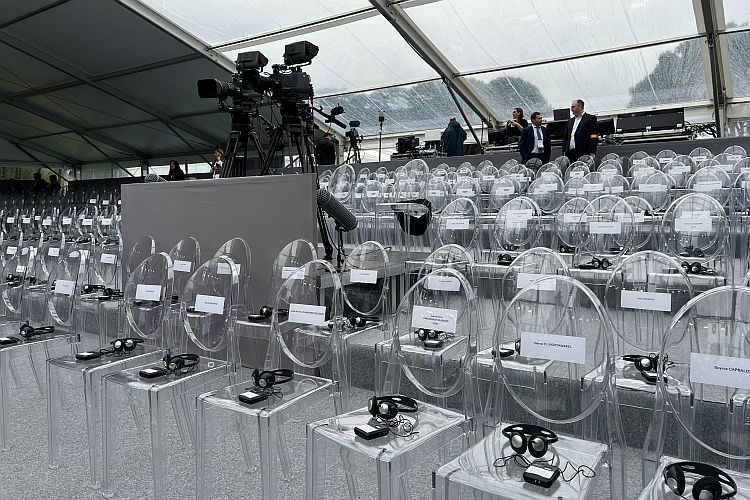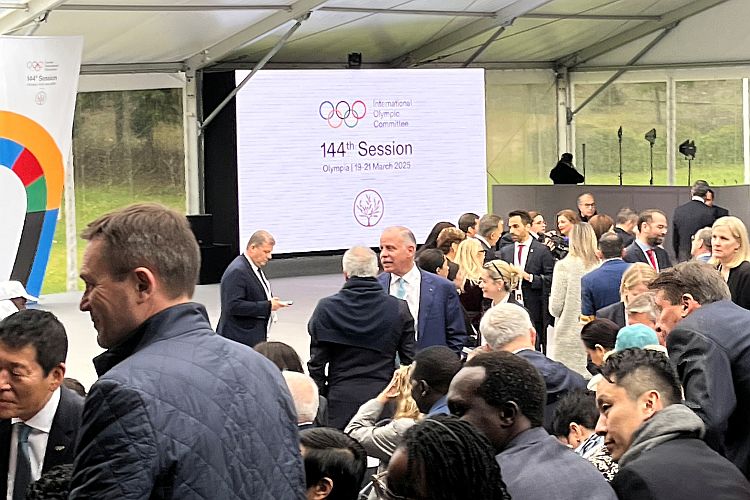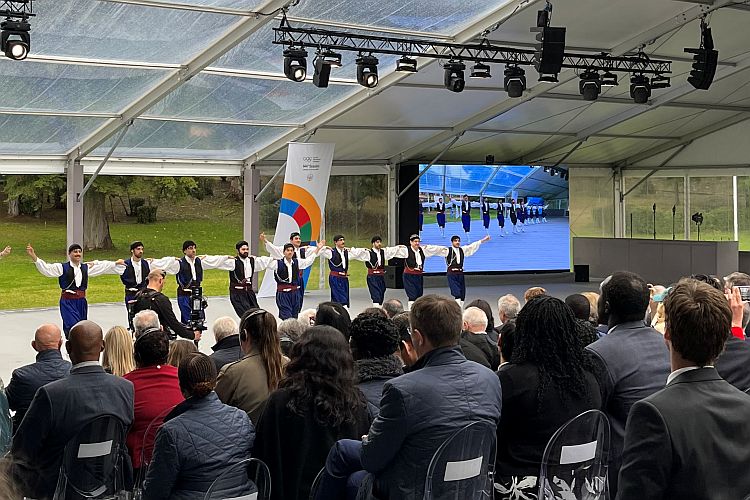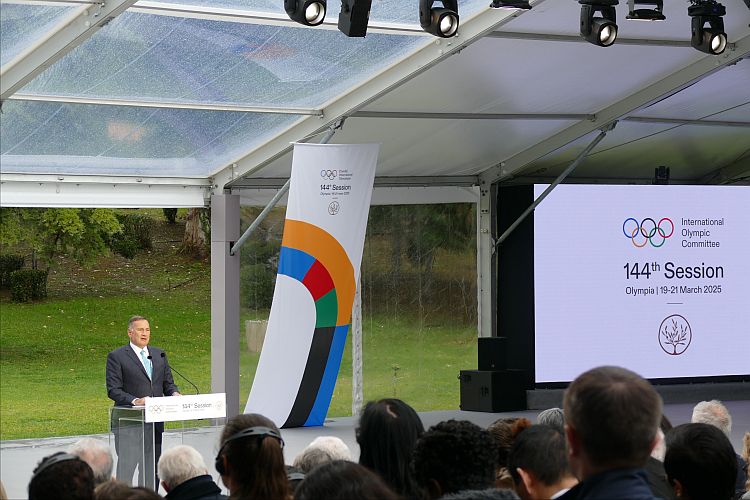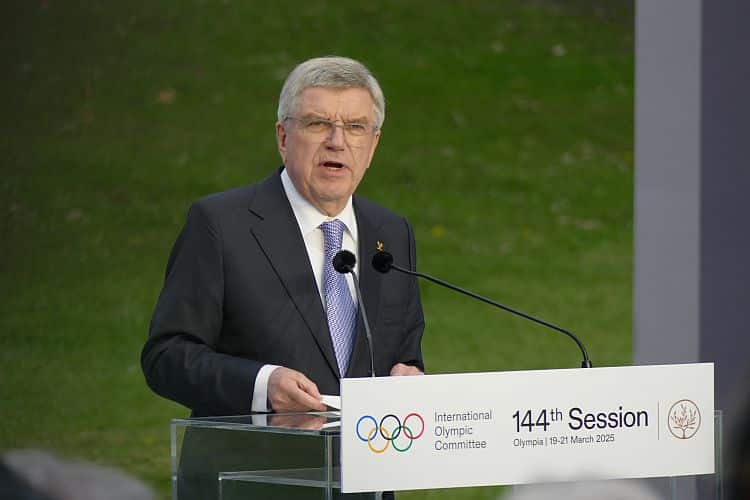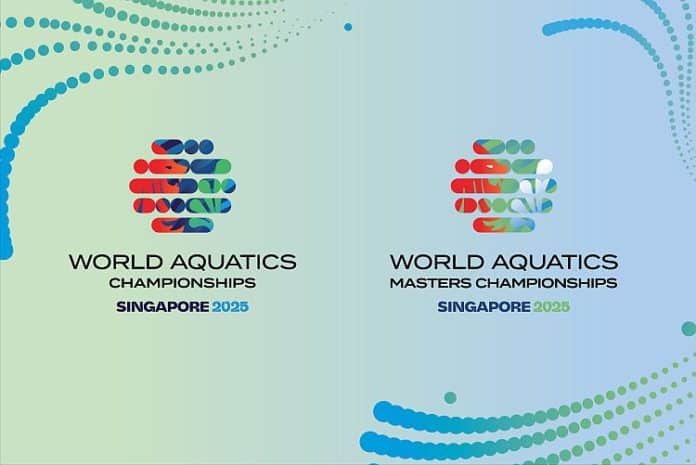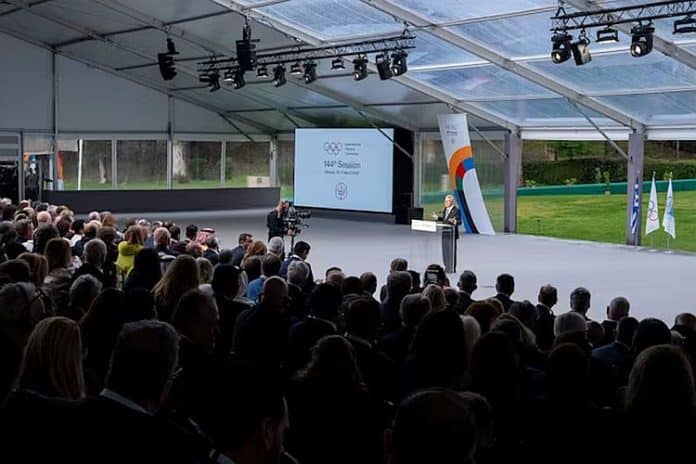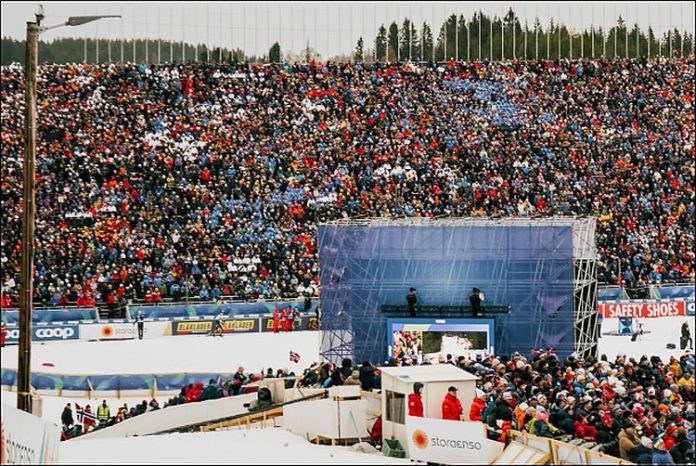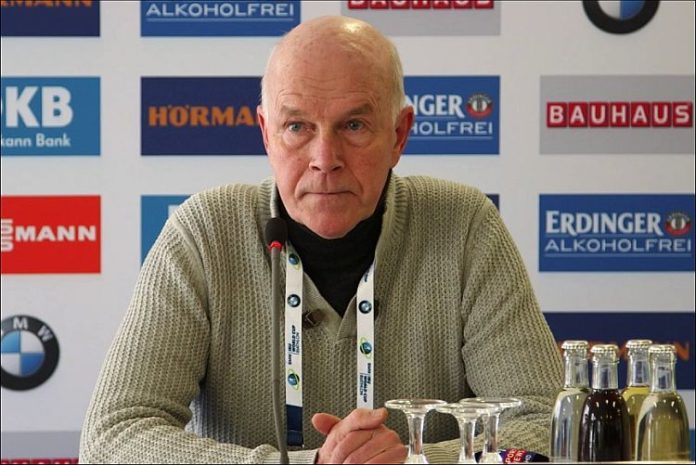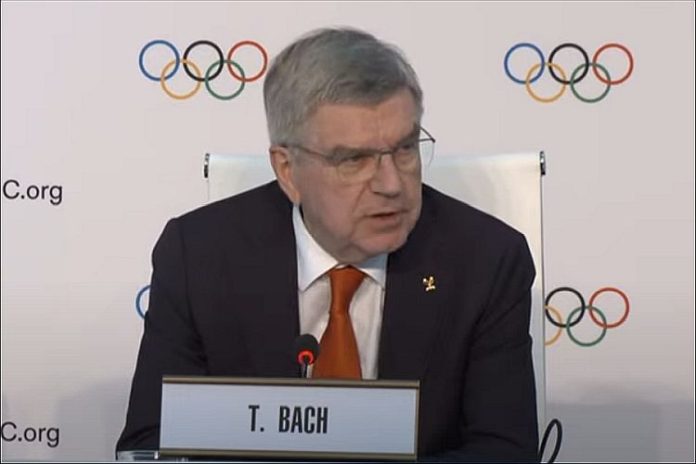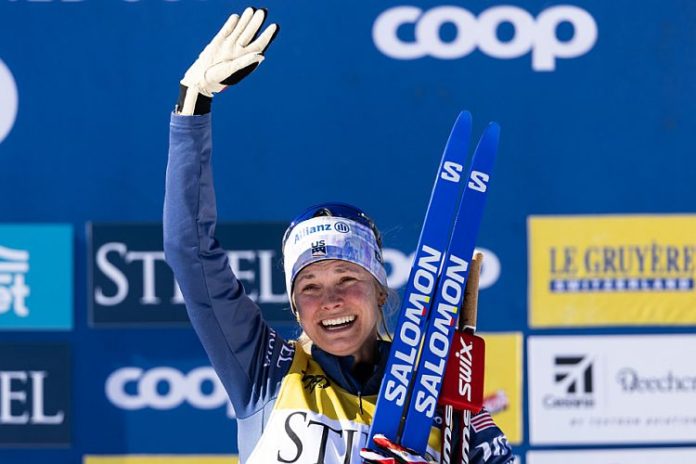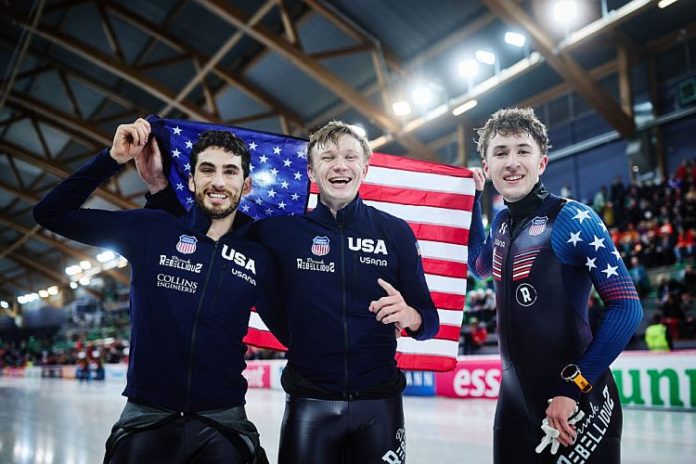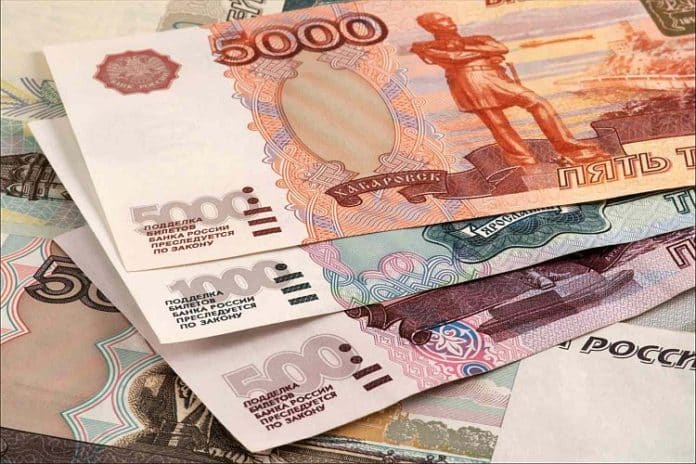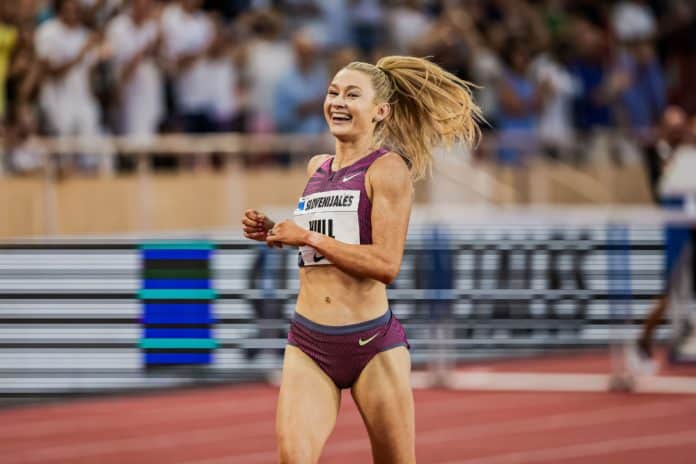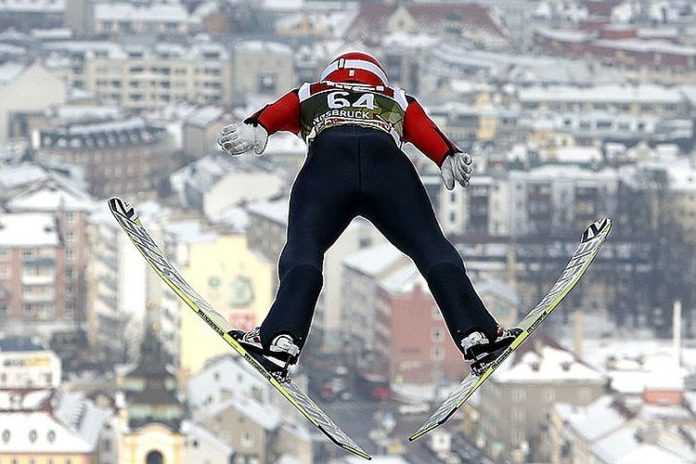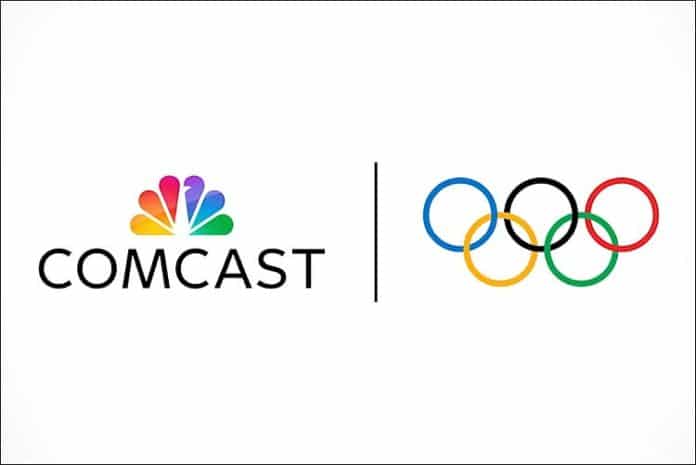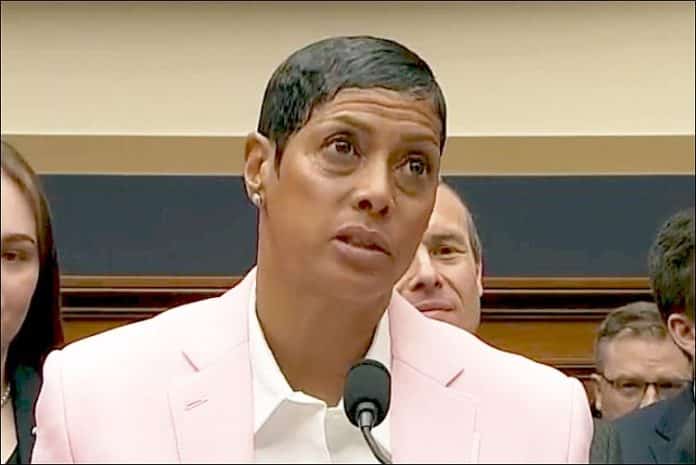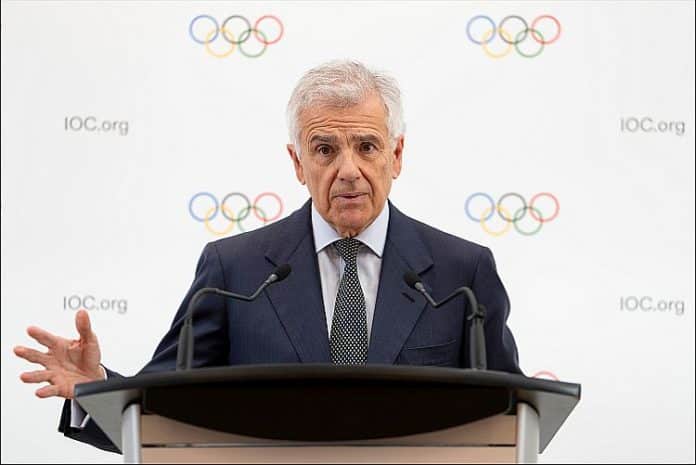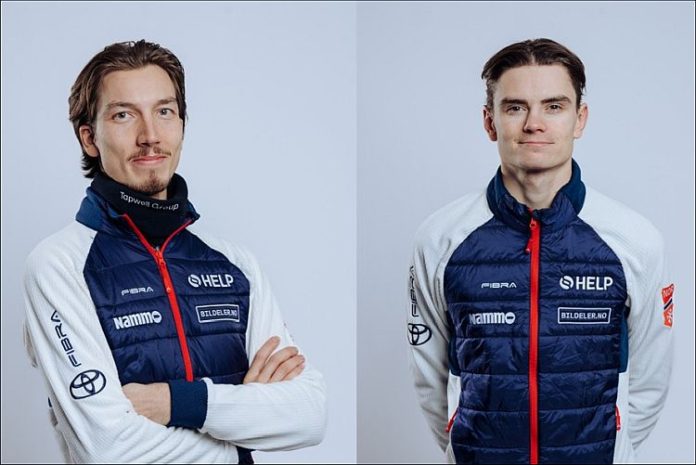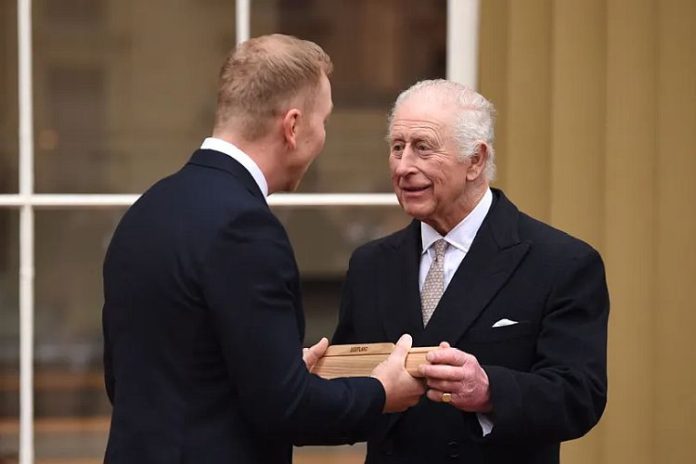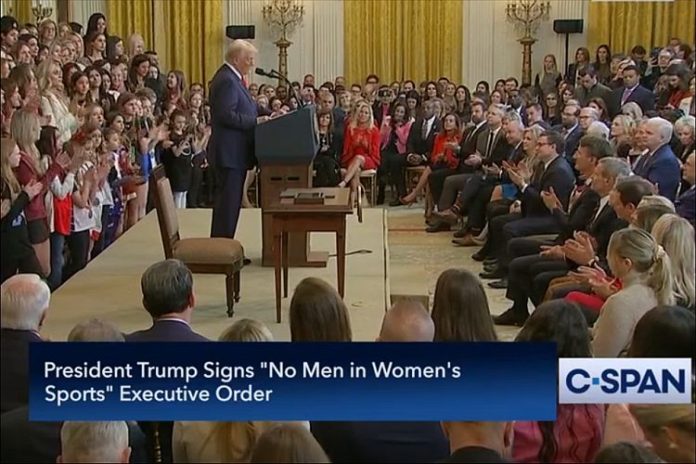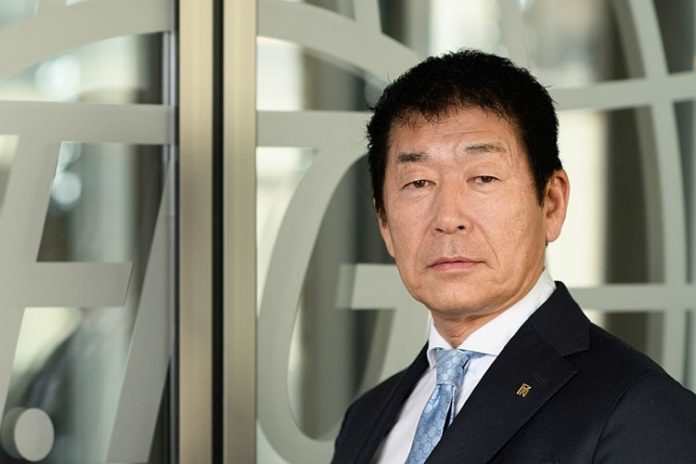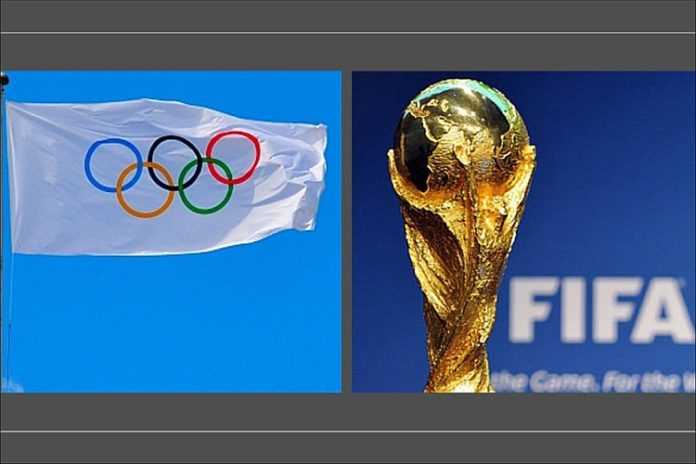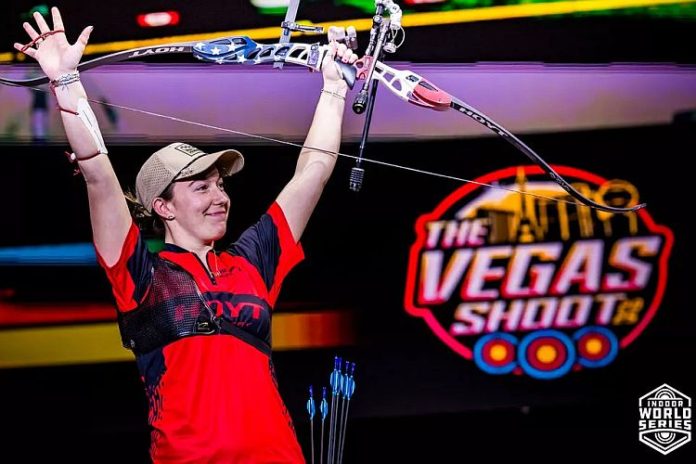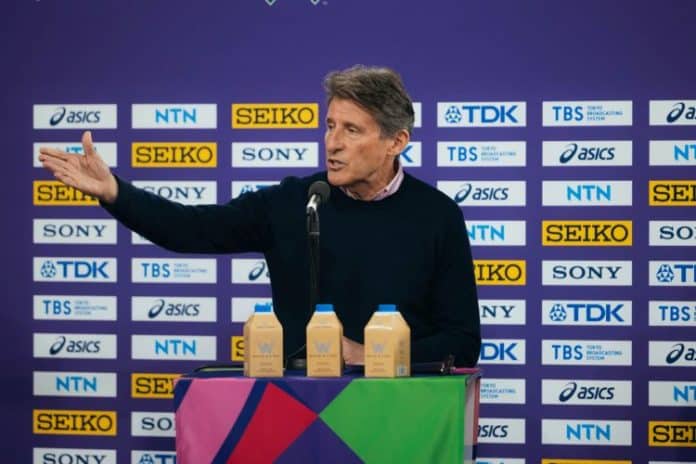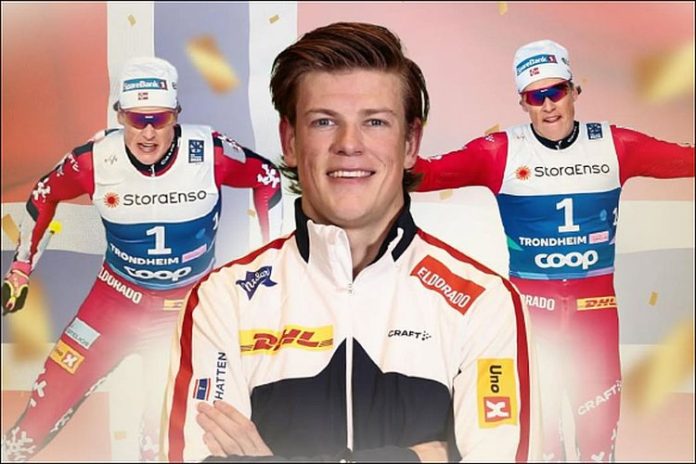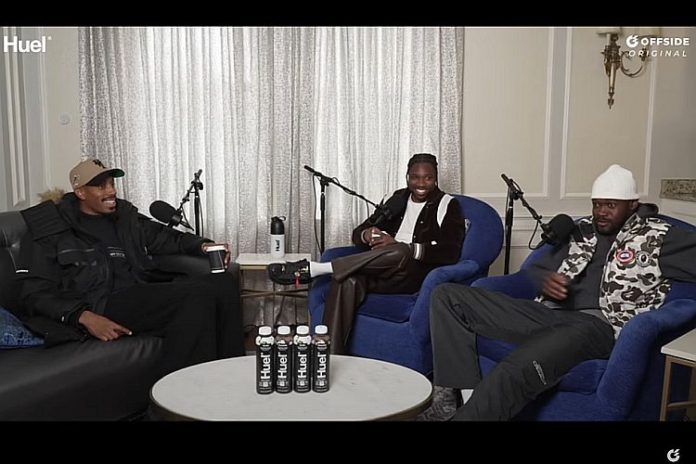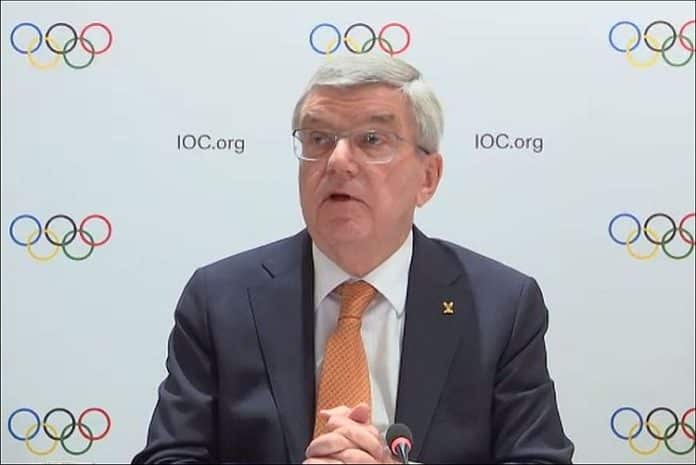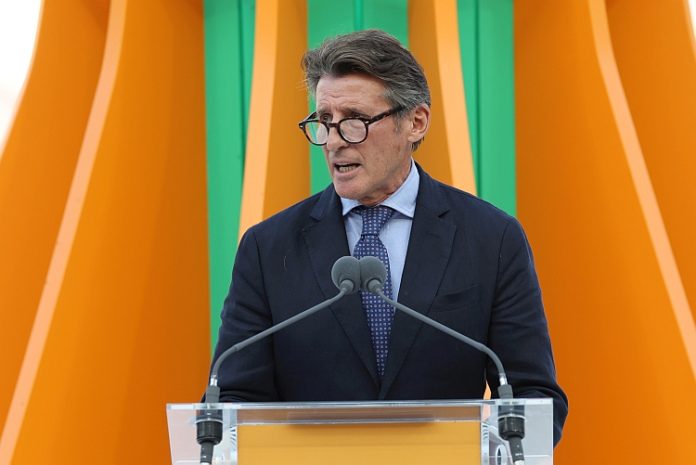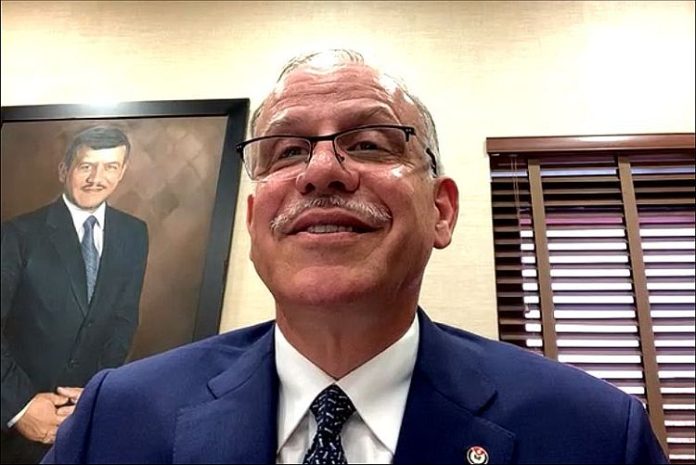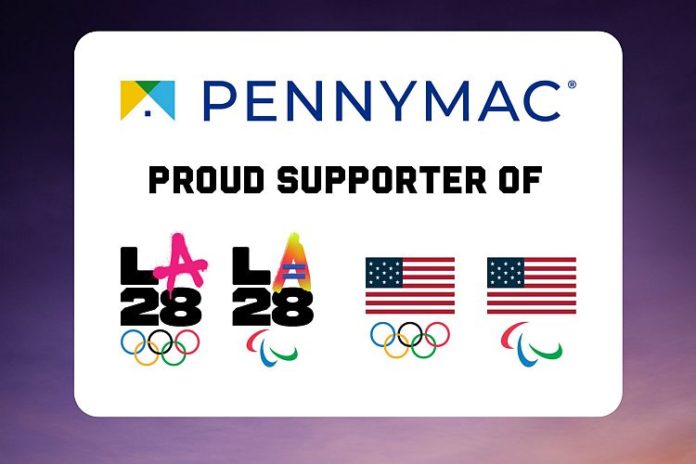★ The Sports Examiner: Chronicling the key competitive, economic and political forces shaping elite sport and the Olympic Movement.★
★ To get the daily Sports Examiner Recap by e-mail: sign up here! ★
≡ THE 5-RING CIRCUS ≡
● Olympic Games 2028: Los Angeles ● Major League Baseball Commissioner Rob Manfred, in Japan for the opening Dodgers-Cubs series this week, told reporters he thinks MLB players might be participants in the 2028 Olympic Games:
“Yes, it’s possible, but we’re not committed to it yet. It is possible.
“We’re having conversations with the Olympics. We think L.A. presents a unique Olympic opportunity for us. We have to have some conversations with our players’ association, and we’re talking to the Olympic Committee as well. But we do see it as an opportunity.”
Baseball and softball are added sports for the 2028 Games, returning to the program after being included in the Tokyo 2020 Games. Baseball was a medal sport in 1992-96-2000-04-08 and then in Tokyo, based in part of the sensational attendance for baseball as a demonstration sport at the 1984 Olympic Games in Los Angeles that averaged 48,195 per session at Dodger Stadium!
● International Olympic Committee ● A group of 406 current and former Olympians signed a petition to urge the seven IOC Presidential candidates to emphasize environmental actions, including cutting emissions, encouraging sustainable organizing committee efforts, “setting a standard regarding high polluting sponsorships” and advocating for more “environmental action.”
Their preferred candidate would be International Ski & Snowboard Federation chief Johan Eliasch (GBR), who has been a champion for environmental causes, but it is not anticipated to be the winner on 20 March.
● Basketball ● The FIBA Executive Committee reported from its Friday meeting, “the status of Russia and Belarus has been extended until the next FIBA Central Board meeting which will take place in May 2025.”
Russian teams have been suspended from international competition since the February 2022 invasion of Ukraine.
● Boxing ● The founding Congress of the Pan American Boxing Confederation, affiliated with World Boxing, elected American Elise Seignolle as its first President, in Panama City (PAN). A two-time national champion, she became a Director of the International Boxing Association in 2022, but left in 2023 due to her disagreement with the governance of the federation. She ran for President of World Boxing at its founding Congress in November 2023 and is now head of the Pan American Confederation.
World Boxing is in position to be accepted this week at the 144th Session of the International Olympic Committee as the governing body for Olympic boxing.
● Football ● At the 40th CONCACAF Congress, held in Saint Lucia, U.S. Soccer Federation President Cindy Parlow Cone was elected – unopposed – for a seat on the FIFA Council.
It’s a continuation of Parlow Cone’s rise in sports administration after her two-time Olympic gold medal career as an American midfielder at Atlanta 1996 and Athens 2004. She retired in 2006 and became U.S. Soccer President in 2020, winning a full, four-year term in 2022.
Under a rule change passed in 2024, the U.S. Soccer President receives an annual stipend of $150,000, Parlow Cone, 46, will now receive, as a FIFA Council member, an annual stipend of $250,000.
● Rowing ● By a vote of 113-15 (with five abstentions), the World Rowing Quadrennial Congress approved a new Rule 13 concerning participation in the women’s category.
The new rule had been proposed to remove transgender women from women’s competition, but the lengthy and technical text of the proposal required some modifications that took considerable time during the first day of the Congress on Friday. By Saturday, however, a modest change in language led to the successful vote.
The primary qualifier to participate in women’s rowing is that “a rower must be either (a) assigned and recognised as female at the time of the rower’s birth (AFAB)” or declared as eligible through a hearing process outlined in the rest of the rule.
Firstly, the rule does not apply to coxswains. Second, the World Rowing Executive Committee is responsible to determine any eligibility issues, with the directive – and this was the changed language – that:
“When considering any issue as to the eligibility of a rower to compete in a women’s event, the over-riding consideration for the Executive Committee will be to ensure fairness of competition for those who are eligible to compete in a women’s event – in particular, whether that rower has acquired a competitive advantage over rowers who have eligibility on the basis of AFAB [assigned female at birth].”
The new rule notes that the appeal format applies to situations including “Sex Identification, Sex-reassignment, Hyperandrogenism, Transgender, and Variations of Sexual Development.” Member federations are required to police this new rule, and World Rowing will form an expert panel to render non-binding advice for cases that come up. The by-law to Rule 13 also passed overwhelmingly, by 124-5 (one abstention).
● Sport Climbing ● Iran climber Elnaz Rekabi, who faced severe sanctions at home from religious authorities after not wearing her headscarf properly at the 2022 Asian championships, has left the country and is apparently in Spain.
Instagram posts by her brother and another climber said she had left Iran, and she has been designated by the International Olympic Committee as an “athlete role model” for sport climbing for the 2026 Youth Olympic Games in Dakar (SEN).
The IOC had been monitoring her situation and her inability to travel freely, although she did appear outside Iran at competitions.
≡ WORLD CHAMPIONSHIPS ≡
● Bobsled & Skeleton ● The final weekend of the IBSF Worlds included the Four-Man and Two-Women races, in Lake Placid, New York, and continued the reign of the amazing Francesco Friedrich.
The German star won his seventh IBSF World Four-Man gold, completing three runs in 2:44.52, after the second run (on Friday) was cancelled due to a section of the track with no ice, causing fellow German Johannes Lochner’s sled to run over bare concrete.
Lochner was second, winning his 17th Worlds medal, in 2:44.80, winning the final run, after going second to Friedrich on the first and third runs. Lochner won the Four-Man gold in 2017, the last time anyone beat Friedrich in the Worlds Four-Man.
Friedrich and Lochner were 1-2 in the Two-Man and Four-Man races at the last two Olympic Games and will be favored to do the same in 2026.
Britain’s Brad Hall, runner-up in 2023, won his second Worlds medal in third (2:45.00), with American Frank Del Duca (with Joshua Williamson, Boone Neiderhofer and Charles Volker) in fourth at 2:45.64. The U.S.’s Kris Horn came in seventh at 2:46.39 and Geoff Gadbois was 18th (2:48.66).
¶
The Two-Woman racing included all four runs, with a German sweep led by Beijing 2022 Olympic champ Laura Nolte (with Deborah Levi), who won all four runs and totaled 3:46.00. It’s Nolte’s first Worlds gold in the Two.
Kim Kalicki (with Leonie Fiebig) was second on all four runs and finished in 3:46.52 for her fifth career Worlds medal, ahead of 2018 Olympic winner and defending champ Lisa Buckwitz and Kira Lipperheide (3:47.46). It’s the second straight medal sweep, with the 2024 order being Buckwitz, Nolte and Kalicki.
The U.S. took the next three places, with Kaillie Armbruster Humphries and Emily Renna (4th: 3:47.52), Kaysha Love and Jasmine Jones (3:47.76) and Elana Meyers Taylor and Lolo Jones (3:47.86).
Overall, including bob and skeleton results. Germany finished with 10 total medals (three wins), to four for the U.S. (2-1-1) and Great Britain (1-2-1).
≡ RESULTS ≡
● Alpine Skiing ● Italy’s Federica Brignone came right to the edge of her second career overall World Cup title with two medals in two events at the FIS women’s World Cup in La Thuile (ITA).
Thursday’s Super-G was the second win of the season for Emma Aicher (GER), in 57.89, trailed by home stars Sofia Goggia (57.95) – the 2019 Worlds runner-up – and 2025 Worlds silver winner Brignone (58.28), with Worlds bronzer Lauren Macuga of the U.S. fifth in 58.44.
After Saturday’s Downhill was canceled due to weather, the second Super-G was held, with Brignone getting her 10th win of the season in 57.95, just 0.01 faster than Goggia, with Romane Miradoli (FRA: 58.00) in third. Lindsey Vonn was the top American, in 13th (58.65).
Brignone has all but wrapped the seasonal title, with the World Cup Final in Sun Valley in the U.S. next week.
¶
There’s no doubt about the men’s overall World Cup race, as Marco Odermatt (SUI) clinched a fourth straight seasonal Crystal Globe at the FIS World Cup in Hafjell (NOR). The Swiss duo of Loic Meillard (2:18.20) and Odermatt (2:18.34) finished 1-2, and 35-year-old Thomas Tumler made it a sweep, in 2:18.43. River Radamus was the top U.S. finisher, in 2:19.70 for seventh.
Sunday’s Slalom saw Meillard double up for his sixth career World Cup gold, winning in 1:57.05 to 1:57.26 for Atle McGrath (NOR) and 1:57.52 for Lucas Pinheiro Braathen (BRA). Benjamin Ritchie was the top American, in 14th (1:58.87).
Odermatt finished the weekend with 1,596 points to 1,006 for Henrik Kristoffersen (NOR), with four events left. For four years, he’s been untouchable.
● Athletics ● Hot action at the NCAA Division I Championships in Virginia Beach, Virginia, especially in the women’s 400 m, with an American Record, one of three world-leading performances.
The men’s 60 m heats produced the three fastest times in the world, as USC’s JC Stevenson won heat two in 6.46, trailed by Jordan Anthony (Arkansas: 6.47) and Nigerian Kayinsola Ajayi (Auburn: 6.48). Anthony won the final in 6.49, with Ajayi second (6.52) and Stevenson sixth.
Zimbabwe went 1-2 in the men’s 200 m, with Kentucky’s Carli Makarawu equaling the world lead at 20.13, followed by countryman (but from Auburn) Makanakaishe Charamba – the prior world leader – at 20.16 in second.
Georgetown’s Abel Teffra won the mile in 3:53.60, just ahead of Nathan Green (Washington: 3:53.99), and in the much-anticipated 3,000 m, a tactical race finished with Ethan Strand (North Carolina) beating Gary Martin (Virginia) to the line, 7:52.03 to 7:52.69. Auburn’s Ja’Kobe Tharp took the 60 m hurdles in 7.45, now equal-8th on the 2025 world list.
Nebraska senior Tyus Wilson won the high jump at 2.28 m (7-5 3/4), no. 9 in the world for 2025, and Daniel Reynolds (Wyoming) moved to no. 2 in the world for 2025 in the hammer, at 25.08 m (82-3 1/2).
USC won the team title with 39 points, to 33 for Georgia.
There was a lot of noise in the women’s meet, with Idyna Mayberry (TCU) storming to a win in the 200 m in a world-leading 22.30, well ahead of Jadyn Mays (Oregon: 22.45, now no. 4). The 400 m saw a break-out for Arkansas junior Isabella Whittaker, who won in an American Record (and world-leading) 49.24, equaling the no. 2 performance of all-time. Whittaker was just 0.07 off of Dutch star Femke Bol’s 49.17 from 2024. Georgia junior Aliyah Butler was second in 49.97.
Sisters Amanda and Hana Moll (both Washington), nos. 1-4 on the 2025 world list, went 1-2, at 4.70 m (15-5), separated only on misses. Baylor senior Alexis Brown moved to equal-5th on the world list, winning the long jump at 6.90 m (22-7 3/4).
Swede Alexina Johansson (Nebraska) won the shot at 19.28 m (63-3 1/4), ahead of Paris Olympian Jaida Ross (Oregon), at 18.98 m (62-3 1/4). Taylor Kesner (Wisconsin) moved up to no. 7 this season in the women’s Weight, winning at 23.50 m (77-1 1/4). Jadin O’Brien (Notre Dame) moved to no. 5 on the world list in the pentathlon, winning at 4,596.
Oregon was an easy winner in the women’s team race, with 55 points to 39 for Georgia and 35 for USC.
¶
Kenya’s defending champion, Abel Kipchumba, repeated as the New York City Half Marathon champion on Sunday, beating U.S. Olympians Conner Mantz and Hillary Bor to the tape in 59:09, now no. 4 on the 2025 world list.
Mantz was close behind at 59:15, the fastest-ever Half time by an American, but on a non-record-eligible, point-to-point course. Bor followed at 59:55, no. 5 on the all-conditions U.S. Half list.
Kenyan Sharon Lokedi, fourth at the Paris Olympic marathon, won the women’s race in 1:07:04, ahead of Fiona O’Keeffe (1:07:46).
¶
At the 40th Los Angeles Marathon, Matt Richtman blew away the field and won in 2:07:56, the first American to win the race since 1994. Sixth at the USATF Half Marathon Championships on 2 March, he won in his second marathon, after a fourth-place finish in Minneapolis in 2:10:47 last year.
His time is so fast, he moves to equal-6th all-time U.S. on all courses; the Los Angeles course is a point-to-point course with a significant downhill segment. Kenyan Athanas Kioko was second in 2:10:55. Tejinesh Gebisa Tulu (ETH) won the women’s race in 2:30:16.
In Barcelona (ESP), Tesfaye Deriba Ketema (ETH) moved to no. 4 on the 2025 world list with a win in 2:04:13; Kenya’s Cornelius Kibet Kiplagat was second in 2:04:54.
● Badminton ● Korea advanced to the finals of three of five events at the BWF World Tour All-England Open in Birmingham, and got two wins.
Top-seed Yu Qi Shi (CHN), the 2018 Worlds runner-up, swept past Chia-hao Lee (KOR), 21-17, 21-19, in the men’s Singles final, but Paris Olympic champ Se Young An (KOR) defeated second-seeded Zhi Yi Wang (CHN), 13-21, 21-18, 21-18.
Korea’s Won-ho Kim and Seung-jae Seo took the men’s Doubles, 21-19, 21-19, from Leo Rolly Carnando and Bagas Maulana (INA), while in the all-Japan women’s final, Nami Matsuyama and Chiharu Shida overcame Yuki Fukushima and Mayu Matsumoto, 21-16, 14-21, 21-17.
In the Mixed Dougbles, Xin Wa Guo and Fang Hui Chen (CHN) defeated Yan Zhe Feng and Ya Xin Wei (CHN), 21-16, 10-21, 23-21.
● Basketball ● Serbia and Canada won the FIBA 3×3 Champions Cup in Bangkok (THA), with the Serbs defeating The Netherlands by 17-16 in the men’s final, and Canada winning over Spain, 15-13, in the women’s championship match.
The U.S. men’s team of Henry Caruso, Mitch Hahn, James Parrott and Dylan Travis finished fourth, losing to Australia in the third-place match, 20-19. Australia also finished third in the women’s tournament, defeating Germany, 18-17. The U.S. women were not entered.
● Biathlon ● The penultimate stop of the IBU World Cup was in Pokljuka (SLO), with home favorite and PyeongChang 2018 Olympic Individual race runner-up Jakov Fak, 37, getting his first win of the season and ninth career World Cup gold in the Short Individual race in 40:52.6 (0 penalties).
He was well ahead of Sturla Holm Laegreid (NOR: 41:26.9/1) and Martin Ponsiluoma (SWE: 41:36.9/2).
France’s Eric Perrot, the 20 km Individual World Champion won the 15 km Mass Start in 35:42.7 (1), ahead of teammate Quentin Fillon Maillet (35:45.8/1) and Laegreid (36:05.0/1). American Campbell Wright was 16th (37:38.6/3).
France continued its domination of the women’s tour with wins in the 12.5 km Short Individual race, by World Champion Julia Simon (38:08.2/0) over Hanna Oeberg (SWE/38:47.3/1), and in the 12.5 km Mass Start, by Lou Jeanmonnot in 39:41.8 (1) over Milena Todorova (BUL: 39:58.2/0). It was Jeanmonnot’s sixth win of the season.
Switzerland’s Aita Gasparin and Niklas Hartweg won the Single Mixed Relay in 40:51.8 (7), with the U.S. in fifth in 41:13.0 (6), with Deedra Irwin and Wright. In the 4 x 6 km relay, Sweden was a clear winner over France, 1:09:07.5 (12) to 1:09:22.3 (6). The U.S. was 12th with Chloe Levins, Margie Freed, Jake Brown and Maxime Germain (1:13:35.0/4).
● Cross Country Skiing ● The FIS World Cup resumed in Oslo (NOR), with the home team continuing to dominate, as Martin Nyenget got his fourth win of the season in the men’s 20 km Classical race, a runaway in 43:34.0. Sweden’s Worlds silver winner William Ponomaa was second in 44:25.2 with Simen Krueger (44:27.2). American Gus Schumacher finished seventh (44:53.9).
Sunday’s 10 km Interval start Freestyle was the sixth win of the season for Harald Amundsen of Norway, in 22:06.4, leading another Norwegian sweep, ahead of Einar Hedegart (22:11.6) and seasonal leader Johannes Hoesflot Klaebo (22:19.2). Schumacher was the top U.S. finisher, in 24th.
Fellow Norwegian superstar Therese Johaug won the women’s 20 km Classical in 49:59.9, ahead of teammate Astrid Slind (50:16.4) and German Victoria Carl (50:53.3). American Jessie Diggins, the seasonal World Cup leader, was 10th in 51:43.7.
On Sunday, It was Swede Moa Ilar with her second career World Cup gold in the 10 km Interval start Freestyle in 25:24.6, ahead of Heidi Weng (NOR: 25:26.2), with Carl third (25:34.6), and Diggins in sixth (25:49.3).
That was enough for Diggins to clinch the seasonal Crystal Globe, her second in a row and third career seasonal title. She now has 2,071 points after 28 of 31 events, with Carl second at 1,641. She is the only U.S. woman ever to win the seasonal title and only she and Bill Koch (1981) are the only Americans to win World Cup seasonal Crystal Globes.
Here’s how great Diggins has been: not only has she won three times, but in the last five seasons, she has ranked 1-2-2-1-1. Wow.
● Cycling ● The 83rd Paris-Nice race in France was a see-saw battle between two-time Tour de France winner Jonas Vingegaard (DEN) and defending champ Matteo Jorgenson of the U.S., but Vingegaard crashed during stage 5 and withdrew after finishing 16th in the stage.
Jorgenson – who rides for the same team as Vingegaard, Visma-Lease A Bike – had the lead on the rest of the field by 36 seconds going into the sixth stage and never looked back. He lost no time on the flat, sprinter’s sixth stage, then stayed with the other contenders in the uphill-finishing seventh stage, entering Sunday with a 37-second lead. He finished second on the hilly final stage in Nice, behind fellow American Magnus Sheffield, and won the race easily, in 26:26:42, a solid 1:15 up on Florian Lipowitz (GER). Sheffield, with his final-stage win, moved up to fourth overall, 2:17 behind the winner.
It’s Jorgenson’s third win on the UCI World Tour and he’ll now concentrate on the one-day Classics circuit before the Tour de France.
The 60th Tirreno-Adriatico in Italy was always going to be decided by the uphill-finishing, 163 km sixth stage and Spain’s Juan Ayuso won the stage by 13 seconds in 4:14:02 with a late, 3 km solo attack. So, he also took over the race lead by 37 seconds and rode home during the seventh stage to a win in 28:41:24 overall. Italian time trial star Filippo Ganna finished second overall (+0:35) with fellow Italian Antonio Tiberi in third (+0:36). Ayuso, just 22, moved up from second in this race in 2024.
¶
The women’s important Trofeo Alfredo Binda in Italy, a 152 km course to Cittiglio, was won by home favorite, and defending champion Elisa Balsamo, winning a final sprint from Blanka Vas (HUN) and Cat Ferguson (GBR) in 4:00:19.
It’s Balsamo’s third win in this race in the last four years, also in 2022; she finished second in 2023 as well!
¶
Triple Olympic medal winner Matthew Richardson scored two wins to headline the UCI Track Nations Cup opener in Konya (TUR).
Richardson won silvers in Paris in 2024 for Australia in the Sprint and Keirin, but now rides for Great Britain, a move not popular in his former country. But he was in front in Konya, winning the men’s Sprint final over (now) teammate Harry Ledingham-Horn, 2-0. He teamed with Ledingham-Horn and Harry Radford to win the Team Sprint over Japan, 42.060-42.194.
No other nation won more than one men’s event, with Muhammad Sahram (MAS) taking the Keirin; Yanne Dorenbos (NED) winning the Omnium over Ashlin Barry of the U.S. by 170-169; Spain’s Sebastian Mora and Albert Torres winning the Madison and Jules Hesters (BEL) winning the Elimination Race.
The seven women’s wins were taken by seven different countries. Liying Yuan of China won the women’s Sprint and 2022 World Sprint champ Mathilde Gros took the Keirin. The Dutch won the Team Sprint and Germany won the Team Pursuit.
Yareli Acevedo (MEX) won the Elimination Race, and New Zealand’s Ally Wollaston, the Olympic Omnium bronze winner, won that event by 128-115 over Lisa van Belle (NED). The Madison went to Denmark’s Tokyo 2020 runner-up Amalie Didriksen, now with Ellen Klinge.
● Fencing ● Japan’s Masaru Yamada triumphed at the FIE Epee Grand Prix in Budapest (HUN), winning the men’s tournament with a 15-10 finals victory over Ian Hauri (SUI). It’s Yamada’s first Grand Prix win in five years; he also won in 2020 in Budapest!
The women’s title went to Anna Maksymenko of Ukraine, who defeated Giulia Rizzi (ITA) in the final by 12-11. Maksymenko, 17, won her first major international medal!
● Freestyle Skiing ● In the FIS World Cup Slopestyle finale in Tignes (FRA), American Alex Hall, the Beijing 2022 Olympic winner, defeated 2021 World Champion Andri Ragettli (SUI), 90.10 to 84.43 for his second win of the season. Those results made them 1-2 in the seasonal standings, with Hall winning at 282, vs. 250 for Ragettli, and 229 for American Colby Stevenson.
Britain’s Kirsty Muir, 20, for her first win of the season – and her first career World Cup gold – in the women’s event, scoring 77.98 to best Abi Harrigan (AUS: 75.41) and Ruby Star Andrews (NZL: 72.75). France’s Tess Ledeux, the 2018 Olympic winner, competed in just three events, but scored 218 points to win the Crystal Globe over 2023 Worlds runner-up Megan Oldham (CAN: 213).
¶
The penultimate stop of the Ski Cross World Cup season was in Craigleith (CAN), with home star Reece Howden taking the men’s opener for his fifth win of the season, this time over Swiss 2021 World Champion Alex Fiva and fellow Canadian Kevin Drury, the 2019 Worlds bronzer.
On Saturday, it was 2023 Worlds runner-up Florian Wilmsmann (GER) first to the line, beating Howden and Drury, taking the seasonal lead over Howden, 850-838.
The women’s races were a sweep for two-time Olympic bronze winner Fanny Smith (SUI), ahead of two-time French Olympian Marielle Berger Sabbatel and Jole Galli (ITA) on Friday, and Canada’s Courtney Hoffos and Abby McEwen on Saturday. Smith has a 916-869 lead over India Sherret (CAN) going into next week’s final races in Sweden.
● Nordic Combined ● At the FIS World Cup in Oslo (NOR), German Worlds relay gold medalist Vinzenz Geiger scored his eighth win of the season, in the 134 m jumping and 10 km Gundersen race, finishing in 22:33.6, just ahead of the retiring Norwegian star Jarl Magnus Riiber (22:34.8). Austria’s Johannes Lamparter was third (22:40.9).
Sunday’s Compact jumping and 7.5 km race was a showcase for Finn Ilkka Herola, the 2021 Worlds runner-up, winning in 17:11.3 over Geiger (17:26.6) and Lamparter (17:29.5). Ben Loomis of the U.S. was 26th.
Riiber said he would end his career in Oslo, so Geiger is the seasonal men’s champ with 1,404 points to 1,385 for Riiber. It’s Geiger’s first title.
The women’s 5 km Gundersen was a runaway for Norway’s Gyda Westvold Hansen, her first win of the season, in 13:46.7, 53 seconds up on Lisa Hirner (AUT: 14:39.7) and seasonal leader Ida Marie Hagen (NOR/14:47.3). Alexa Brabec was the top U.S. finisher, in 18th.
Sunday’s Compact 5 km event was another win for Westvold Hansen in 13:44.2, over Hagen (13:59.8) and Haruka Kasai (JPN: 14:07.0). Brabec finished seventh, in 14:34.1. German Nathalie Armbruster (GER) won the seasonal title with 1,130 points, to 1,042 for Hagen.
● Ski Jumping ● The FIS World Cup moved to the giant, 240 m ski-flying hill in Vikersund (NOR), with high winds playing havoc with the schedule.
The men’s opener was a win for German Andreas Wellinger, the 2025 Worlds Normal Hill runner-up, scoring 436.1 points to win over Slovenia’s Timi Zajc (427.8) and Anze Lanisek (422.7).
On Sunday, Worlds Large Hill gold medalist Domen Prevc scored another mega-hill win, scoring 214.5 in the only round scored, due to wind. Wellinger was second (199.2) and Japan’s Ryoyu Kobayashi (191.2) was third.
Slovenian star Nika Prevc won her eighth straight World Cup in the first women’s jumping, scoring 201.1 for the one-round event, due to high winds in the morning. Teammate Ema Klinec (169.8) was second and Selina Freitag (GER: 157.0) was third. More wind canceled the Sunday jumping completely.
● Ski Mountaineering ● At the ISMF World Cup in Schladming (AUT), Swiss star Remi Bonnet – who won two Worlds golds this year – took the Vertical Race in 19:10.9 for his fifth win of the World Cup season. France’s Thibault Anselmet was a distant second in 19:41.6; American Cameron Smith was seventh in 20:11.5.
Spain’s sprint star Oriol Cardona Coll, the Sprint World Champion, won the Schladming Sprint in 2:37.49, ahead of Anselmet (2:42.40). Cardona Coll has now won four of five sprints this season.
Swede Tove Alexandersson, the Individual Race World Champion, took the women’s Vertical in another runaway, in 22:37.4, to 22:55.8 for French star Emily Harrop, the 2025 Sprint World Champion.
Harrop followed up with a Sprint win, her fifth in five World Cups this season, in 3:08.57. She was more than five seconds up on Marianne Fatton (SUI: 3:13.60).
● Snowboard ● The FIS World Cup in Slopestyle finished up in Flachau (AUT), with bad weather canceling the men’s event altogether and the women’s standings using the qualifying round only.
The men’s seasonal standings were based on just four events, with Canada’s Cam Spalding the winner (230 points) to 192 for 2018 Olympic champion Red Gerard of the U.S.
The women’s winner from qualifying in Flachau was New Zealand’s 2022 Beijing Olympic champ Zoi Sadowski-Synnott, scoring 89.50 to 85.25 for Annika Morgan (GER). Sadowski-Synnott also won the seasonal title, with 312 points to 300 for Britain’s 2023 World Champion Mia Brookes.
¶
The Snowboard Parallel season finished at the FIS World Cup in Winterberg (GER) with a Parallel Slalom, and the first win of the season for Matthaus Pink, over Arvid Auner in the all-Austrian final. Italy’s Maurizio Bormolini won the bronze.
Bormolini won the men’s Parallel Overall with 910 points, to 731 for Andreas Prommegger (AUT), and Auner won the men’s Parallel Slalom title, with 299 points.
Austria’s Sabine Payer, the 2023 Worlds Parallel Slalom bronzer, won the women’s final over German Ramona Theresia Hofmeister, with Zuzana Maderova (CZE) taking the bronze. Japan’s Tsubaki Miki won the seasonal Parallel Overall title with 1,209 points over Hofmeister (1,034). Miki also won the Parallel Slalom title (405), with Payer second (326).
● Table Tennis ● The fourth season of WTT Champions began in Chongqing (CHN), with Paris Team and Mixed Doubles winner Chuqin Wang (CHN) winning the men’s title, 4-1, over countryman Shidong Lin, 11-5, 6-11, 11-7, 11-5 and 11-6. It’s Wang’s third career Champions tournament title.
The women’s tournament was another win for two-time Olympic runner-up Yingsha Sun (CHN), who shut out teammate Xingtong Chen by 4-0: 11-7, 11-4, 12-10, 11-7. This is Sun’s sixth win in the Champions series, out of 11 tournaments held all-time!
¶
★ Receive our exclusive, weekday TSX Recap by e-mail by clicking here.
★ Sign up a friend to receive the TSX Recap by clicking here.
★ Please consider a donation here to keep this site going.
For our updated, 895-event International Sports Calendar for 2025 and beyond, by date and by sport, click here!












